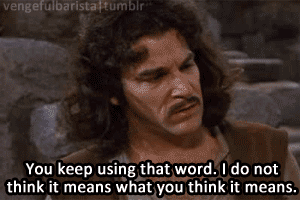How to Distinguish Between Commonly Confused Terms
/At risk of coming across as a pompous sudo-English professor, I've got a mini English lesson in store for you. A lot of people actually wonder about this stuff, enough that they are common google searches, so I'm really just trying to be helpful.
Now I realize that some are you are gonna be all:
And that's okay. But for those of you who like words or don't know how to use irony correctly and want to, please stick around.
As I've previously mentioned- I'm a word nerd and I love language. With that in mind I thought I'd go over some common word misusage. The following are a few words that get thrown around a LOT and often in the wrong context. Yes, fine, we probably knew what you meant, but seriously you will upgrade your power of speech significantly if you can use these properly. Plus, you really will win major favor with other obnoxious word nerds like me.
Ethics versus Morals
Ethics (in the practical sense) are rules/laws about right and wrong from an external source, typically society at large. Ex. government laws, a company's rule book. In the philosophical sense, ethics deals with theories about what is good for society.
Morals are an individual's own principles.
For example, smoking marijuana may go against society's ethics (although that is now shifting) and result in a fine or incarceration, but an individual may not think that smoking marijuana is immoral. Violating ethics usually results in some sort of punishment by law or a company ethics committee, while violating your own moral code tends to result in shame or depression. The two often overlap as ethics tend to reflect the morality of the people, but since morality is individual, what is deemed ethical by society may not align with some people's own sense of morality. Also, something can be deemed unethical in the philosophical sense if it does harm to society, even if it goes without reprimand. This actually happens a fair bit because:
- Our lawmakers are supposed to be concerned with defining the country's ethics code. The political parties are supposed to be offering different points of view with regard to what is ethical based on how they define society, but ultimately still be debating what is beneficial for society at large. Instead, recent history has found politicians debating morality.
Envy versus Jealousy
Envy is when you covet something that someone else has.
Jealousy is when you are afraid of losing something you already have.
You can be jealous of your boyfriend flirting with another girl because you are afraid of losing your boyfriend. You are envious of that girl if you want her shoes or great hair.
Let me state this again for the record since this is such a common confusion: if someone else has something you want the word is ENVIOUS. If someone achieves something that you've wanted to achieve you are ENVIOUS. Unless you are afraid of losing something or being replaced, jealousy isn't the correct term.
Irony versus Coincidence
via pinterest
Unfortunately, Alanis Morissette got this one a bit wrong. Pulling from the NY Times, "Not every coincidence, curiosity, oddity and paradox is an irony, even loosely. And where irony does exist, sophisticated writing counts on the reader to recognize it.” Okay, so I'm not trying to make us all NY Times worthy writers, but here's some helpful info regarding IRONY.
First off, just to complicate matters, there are multiple different types of irony. I'm going to avoid dramatic irony and tragic irony since this is not a Shakespeare class. Here are the two types of irony that are commonly used today:
Situational Irony is when there is an incongruity (or reversal) between what is expected and what actually happens. Meaning: what happened is not what you would have expected. For example, it is ironic when a couple chooses to have an indoor wedding in order to avoid the rain and the sprinklers end up going off during the indoor wedding. Another example would be if a criminal returned to the scene of the crime to cover up his tracks, only to end up leaving new evidence that actually leads to his capture.
Verbal Irony is when the intended meaning is opposite of what is said. Sarcasm is an example of verbal irony, as is understatement and overstatement. There is also something that I will call "Non-Verbal" irony because it's technically not spoken, but it's the same usage. The best example of this is modern day hipsters. Hipsters wear clothing that is indicative of a certain genre or social statement, but wear it "ironically" because they are actually meaning to make fun of that trend.
Coincidence is when two things occur in such a manner that it would appear as if they had been planned or prearranged even though they were not.
For example, everyone showing up to a party wearing the same colored shirt is a coincidence. Rushing to make it to your flight on time, then getting to the airport and finding out your plane has been delayed is just a coincidence.
The trouble with irony is that it is somewhat dependent upon one's expectation. Therefore, technically some events could seem ironic to one person and coincidental to another. For example, believe it or not: if a daredevil manages to complete all of his stunts without injury and then trips while walking and breaks his arm- that's really coincidence. The fact that he tripped while walking isn't truly ironic because people trip and fall sometimes. Although, if you were talking to this daredevil and asked him, "How did you break you arm? Did you fall off your motorcycle or hurt yourself cliff diving?" And he replies, "Actually, I tripped while walking down the street." You would find that ironic since it was the opposite of what you were expecting. All in all, there is definitely some leeway.
But for the record: "a traffic jam when you're already late" is just a coincidence.
Sympathy versus Empathy versus Pity
Sympathy is a recognition or understanding for the situation of another. Acknowledging another's hardship or challenge with support or encouragement. Think "comforting" someone.
Empathy is when one actually feels and relates to the emotions of another person. One has experienced that hardship before or can place himself in that person's shoes. Think "relating to" someone.
Pity is when someone compares one's personal situation to someone else's and feels better off. Think "feeling sorry for" someone.
Well, there you go! I hope that has cleared up a few things. If you have any questions about the correct use of those words, feel free to ask. Otherwise go forth my newly educated readers and spread annoyingly accurate speech throughout the land!














